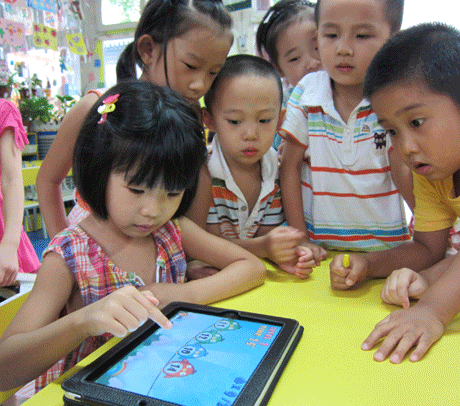Apps for tots
Updated: 2011-10-24 07:58
By Guo Shuhan (China Daily)
|
|||||||||
|
Tablet computers appeal to youngsters, with their user-friendly touch screens and eye-catching animations. [Provided to China Daily] |
Smartphones and tablet computers are becoming popular tools of preschool education and companies designing suitable educational applications have been quick to cash in. Guo Shuhan reports.
Liu Jing's 4-year-old daughter Tiantian skillfully unlocks Liu's iPhone. Her small index finger slides on the touch screen to find and click the icon of her favorite picture book. She then turns the phone screen horizontal, holds the phone in both hands and listens intently to the story.
Like many of her peers, Tiantian sees the smartphone as an electronic toy that can tell as many as 200 stories. The stories, downloaded by Liu, are voiced by a child and accompanied by lively images.
Along with the smartphone and tablet computer, Chinese parents are also taking to educational applications (apps) in a big way to stimulate their preschoolers' interest in learning.
While their eye-catching animations help engage short attention spans, the gadget's user-friendly touch screens help develop quick reflexes in the kids.
"My daughter is now more willing to spend time on reading. I usually buy her paper copies of the stories she likes most. She is more eager to communicate with adults and often imitates what she sees on screen to tell her stories," the mother from Jiangsu province says.
Beijinger Liu Jia decided to buy an iPad in March, after coming across numerous online posts by other mothers about how they had cultivated their child's interest in learning with the tablet computer.
Besides books, Liu Jia also downloads games for her 3-year-old daughter, Meitong.
The mother says some games have strengthened Meitong's observation skills. For instance, when they play games that require the child to spot differences between two seemingly alike pictures, Liu says Meitong consistently performs better than her peers.
Engineer Father (www.appshare.cn) is a Shanghai-based website which specializes in offering educational apps.
The online platform, established in June, now has 25,000 apps developed by the website and another 56 companies. They come with recommended age of use and are grouped into five categories - General Knowledge, Chinese, English, Math and Art.
Li Wenhua, founder of the website, says the most sought after apps are the so-called "talking books", English learning tools and games for language development.
During the recent National Day holiday, a free promotional app for learning Chinese characters, named Baobei Xiezi, developed by the website and offered for $1.99, saw an average of 10,000 daily downloads, according to Li.
The website founder attributes his inspirations for apps to his 4-year-old son. He recalls how the little boy went through the entire picture book of the classic Journey to the West in two days on his iPad. He could accurately narrate nearly 80 percent of the story.
He credits his son's interest in the piano to his music software. When the boy ran his fingers across the five-line staff, and heard the sound it produced, he asked to attend piano classes.
Beiwa (www.beva.com) is one of the companies cooperating with Engineer Father and is a popular educational website that provides multimedia products for children between 1 and 6.
Founded in July 2010, Beiwa has produced a series of products including paper books, audio and video clips, and online games, mostly featuring its beaver-like cartoon characters, Bei Wa and Bei La.
It started designing apps in June and its current collection of 20 sees a download of 65,000 every day.
Beiwa also has learning packages built around certain topics every month, catering to different age groups.
For instance, color is October's theme for toddlers; kids between 3 and 4 are learning why they need soap to clean their hands; and older children are learning how bread is made.
Wang Shiguang, marketing director of Beiwa, says the company will roll out new apps every month.
"Apps for the tablet computer and smartphone provide an alternative way to help preschoolers broaden their horizons and absorb knowledge," says Cheng Fangping, professor at Renmin University of China in Beijing and adviser to Beiwa.
The education expert says when parents want their young children to do something but find them uncooperative, it does not mean their children are disobedient. Instead, the children may merely have not understood what their parents want from them.
But when these same expectations are conveyed in the course of playing a game, the message becomes much more effective.
Cheng, however, suggests that children play for not more than 30 minutes at a time, considering the potential adverse impact on their eyesight.
He says a fixed time will also help a child inculcate self-discipline.
Meanwhile, the professor stresses that child-friendly technology is just one component of preschool education.
"Parents should take their children out to embrace the real world. They (parents) should allow their children to spend time getting along with their peers and learn to help with some simple housework," Cheng says.












